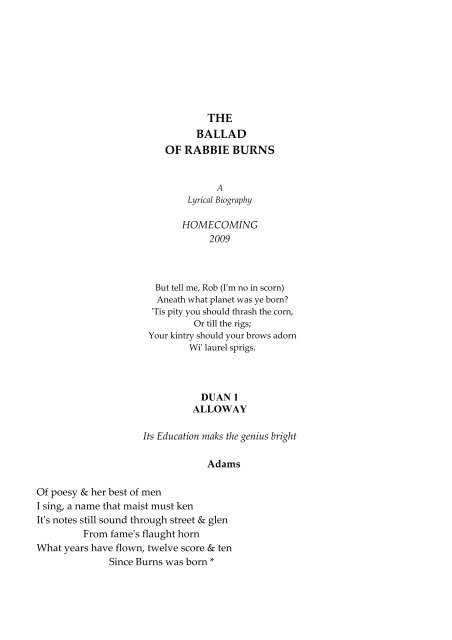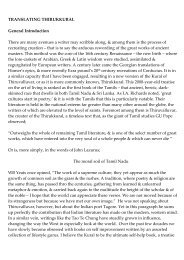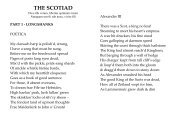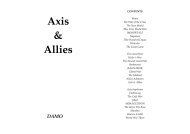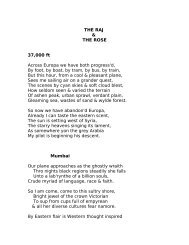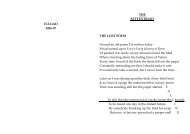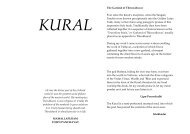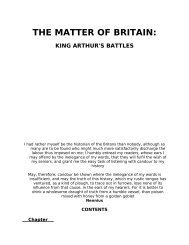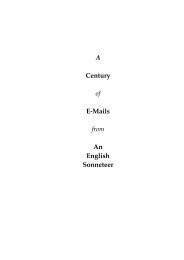THE BALLAD OF RABBIE BURNS - damowords
THE BALLAD OF RABBIE BURNS - damowords
THE BALLAD OF RABBIE BURNS - damowords
Create successful ePaper yourself
Turn your PDF publications into a flip-book with our unique Google optimized e-Paper software.
<strong>THE</strong><br />
<strong>BALLAD</strong><br />
<strong>OF</strong> <strong>RABBIE</strong> <strong>BURNS</strong><br />
A<br />
Lyrical Biography<br />
HOMECOMING<br />
2009<br />
But tell me, Rob (Iʹm no in scorn)<br />
Aneath what planet was ye born?<br />
ʹTis pity you should thrash the corn,<br />
Or till the rigs;<br />
Your kintry should your brows adorn<br />
Wiʹ laurel sprigs.<br />
DUAN 1<br />
ALLOWAY<br />
Its Education maks the genius bright<br />
Adams<br />
Of poesy & her best of men<br />
I sing, a name that maist must ken<br />
Itʹs notes still sound through street & glen<br />
From fameʹs flaught horn<br />
What years have flown, twelve score & ten<br />
Since Burns was born *
His father toiled thro snow & sun<br />
Crafting an elegant garden<br />
Grafting for friendly gentlemen **<br />
Of small estate<br />
Whose first born, Rab, tho poor manʹs son<br />
Was rich in fate<br />
This lad soon proved a wiseling wean<br />
Whose dad had movʹd from Aberdeen<br />
To marry him a harvest queen<br />
From fair old Ayr<br />
Who soon sired six more siblings lean<br />
Rabʹs bed to share<br />
They settlʹd by the gentle Doon<br />
With kettle‐happy Granmaʹ Broun<br />
Who whistlʹd muckle lip‐suckʹd tune<br />
While cooking neeps<br />
Or mutterʹd tayles neath brightʹning moon<br />
To frighten sleeps<br />
She spoke of elfcandles, spunkies<br />
Of witches, warlocks, wraiths, kelpies,<br />
Of dragons, giants & brownies<br />
From realms faerie<br />
Such wyrd & wondrous trumperies<br />
Fuellʹd Rabʹs fancy<br />
His mind was as the green, young corn<br />
That grows before the golden dawn<br />
But as Burns was a poet born<br />
Of no mean clout<br />
Like Venus in the puff of morn<br />
His stalk stood out
As Rabʹs mind strides from infantʹs mruk<br />
He understands all men must work<br />
With moral moulded by his kirk<br />
Through rant & scowl<br />
& if in labour they would shirk,<br />
Our bellies growl<br />
His father was a Jacobite<br />
Who said, ʹGood men will always fight<br />
For what they felt was wrong & right<br />
Whethʹeʹer they died!ʺ<br />
Whetting a poets appetite<br />
For native pride<br />
Unless a man would be a fool<br />
The boy in him must skip to school ***<br />
Where endless repetitions rule<br />
His daily grind<br />
& better teachers fire & fuel<br />
A gay, wee mind<br />
James Murdoch was the latter sort<br />
His patience long, his lectures short<br />
Sensing this Burns the best heʹd taught<br />
Or ever would<br />
Eʹen tho the ladʹs classroom report<br />
Not always good<br />
For Rab swift to react fiercely<br />
Fists fly at ilk playground bully<br />
& aifter he would cheeky be<br />
With verbal dash<br />
Soon silenced upon Murdoch’s knee<br />
With backside’s thrash
But gie him guid books for inspection ****<br />
Like Mason’s eclectic collection<br />
His soul felt haul’d in one direction<br />
Poesy’s uplifts<br />
Homework rarely needing correction<br />
Such were his gifts<br />
As vernal Burns PATRIOT is<br />
The Blacksmith who shod his horses<br />
Lends him a book on brave WALLACE<br />
His triumphs & pains<br />
Pouring sic SCOTTISH prejudice<br />
Down his boiling veins<br />
& so the muses have their way<br />
But not Edina, grand & grey<br />
Nor Glasgow or green Galloway<br />
Can this bard claim<br />
Twas wee & airy Alloway<br />
First felt Rab’s fame
DUAN 2<br />
MOUNT OLLIPHANT<br />
The Muse, nae poet ever fand her<br />
Til by himself he learn’d to wander<br />
Adown some tottin’ burn’s meander<br />
Robert Burns<br />
The Burns’ moved to Mount Olliphant *<br />
Where young Rab made to grunt & pant<br />
Ploughing the land for seeds to plant<br />
In wind & rains<br />
But still in studies most days spent<br />
To feed his brains<br />
Dalrymple school would always tell<br />
As soon as Burns could amaist spell<br />
He to the crambo‐jingle fell<br />
Tho rough & rude<br />
& Scotia’s muse, that crooning belle<br />
In him renewed<br />
For as a plough the boy did hold<br />
His fingers whitening with cold<br />
His father growing grim & old<br />
He sang sweet song<br />
How many lines of verse unfold<br />
From Rab’s sweet tongue
But written down! No, not a jot<br />
A poet drown’d in his life’s lot<br />
Chain’d to the daily porridge pot<br />
Ne’er knowing meat<br />
& only ma’s broth, thick hot,<br />
He loved to eat<br />
Rab felt he was a galley slave<br />
Bullwhipp’d to plough the foaming wave<br />
From early morn to early grave<br />
Without respite<br />
& escaping in books did crave<br />
Come candl’d night<br />
& foregether’d with family<br />
They shared old sangs & poetry<br />
Or snippeting thro history<br />
From Bruce to Rome<br />
For Burns was luckily bless’d wi’<br />
A braw Scotch home<br />
Rab soon absorbed his ain zeitgeist<br />
Learnt of the goods ilk cotter priced<br />
Read Grecian gods & Jesus Christ<br />
Kenn’d ailments sair<br />
But not yet how hearts crush’d & sliced<br />
By maiden’s fair<br />
Until the lad had turn’d sixteen<br />
At harvest coupling, when his e’en<br />
Was fill’d with fairest country queen<br />
One autumn less<br />
She was the fairest he had seen<br />
In dance & dress
The lass could sing with such sweet feel<br />
How Rab’s young heart would wrack & wheel<br />
His mind riming to every reel<br />
With spangling pang<br />
From whence his soul began to deal<br />
In sense & sang **<br />
To Kirkanswald Rab’s studies post<br />
Where Uncle Broun plays perfect host<br />
For schooling on a smuggler’s coast<br />
Where puffin flies<br />
Where tavern‐snug at every toast<br />
His bar bills rise<br />
Twas here Rab first felt Alba’s blast<br />
A people proud of all that’s pass’d<br />
& how their liberty held fast<br />
Thro prayer & toil<br />
How poetry bloom’d thick & fast<br />
In Scotia’s soil<br />
Burns was a sponge to bookish lore<br />
Harvesting tales to set in store<br />
For future days, as more & more<br />
He delved thro words<br />
‘Til some distracting lass next door ***<br />
Sang like sangbirds<br />
It fell upon a Lammas night<br />
When he first saw a breast fair white<br />
& rous’d up lusty appetite<br />
‘Mang barley rigs<br />
Of how to squeeze & tease & bite<br />
& squeal like pigs
Thus losing his virginity<br />
& musing trigonometry<br />
Rab cruises back to his country<br />
Some mouse from toon<br />
Sack full of sangs & poetry<br />
His pen slapp’d doon!<br />
Tis said all poets need a muse<br />
To lead their souls to finer views<br />
Of love & life so they can lose<br />
Dull minds in beauty<br />
Far prettier than psalmic pews<br />
On solemn duty<br />
Now Rabbie with a lass does clash<br />
His wee dog cross her wash does dash<br />
& there did CUPID lightning flash<br />
On young amour<br />
Pretending not to gie ane fash<br />
This both ignore *<br />
##DUAN 5<br />
MAUCHLINE<br />
Of a’ the airts the win’ can blaw<br />
I dearly love the west<br />
For there the bonnie lassie lives<br />
The lass I love the best<br />
There wild woods grow & rivers row<br />
& mony a hill between<br />
But day & night, my fancy’s flight<br />
Is ever wi’ my Jean<br />
Robert Burns
They met again that Halloween<br />
“Hello, I’m Rab,” “Hello, I’m Jean”<br />
The loveliest in all Mauchline<br />
Leggy gazelle<br />
With tempting lips & rougish een<br />
& breasted well! **<br />
At first Rab thought her wee young thing<br />
But then he heard an angel sing<br />
& watch’d her nimble, sma’ feet spring<br />
To beat & fiddle<br />
& so he join’d her in a fling<br />
Arms flung a‐middle<br />
Rab woos Jean with a course romance<br />
Delighted by his staggish dance<br />
Excited by his countenance<br />
& dark complexion<br />
When clapping snapp’d the cailedh‐trance<br />
Lips made connection<br />
Meeting in secret from her pa<br />
Jean fell for Rabbie’s gabby star<br />
Whose fingers shynesses unbar<br />
Her heart to win<br />
So she lay down, long legs aspar<br />
& let love in<br />
As Rab meander’d hame that night<br />
He saw a vision’s blazing light<br />
Outlandish Hizzie came in sight<br />
Ayr’s ain goddess<br />
Her name was Coila, wild & bright<br />
In haelan dress
Down flow’d her robe, a tartan sheen<br />
Til half a leg was scrimly seen<br />
& such a leg, his bonnie Jean<br />
Could only peer it<br />
Sae straight, sae taper, ticht & clean<br />
None else came near it<br />
Said Colia, “Hail thee, mine own bard,<br />
In me they native muse regard<br />
No longer mourn thy fate is hard<br />
Thus poorly low<br />
I come to give thee such regard<br />
As gods bestow!<br />
My boy, wear this!” she solemn said<br />
& bound a holly round his head<br />
The polish’d leaves & berries red<br />
Did rustling play<br />
As like a passing thought, she fled<br />
In light away<br />
As rubbers Rabbie rarely used<br />
Jean’s bump her da’ soon unamused<br />
Whose brulzie face point blank refused<br />
Jean for a wife<br />
Rab left the Armour’s most confused<br />
In all his life<br />
He had to nurse his broken heart<br />
By heaping up the harvest cart<br />
& saw his sharp plough rip apart<br />
Some nested house<br />
Where, on the spot, a rhyme did start<br />
For this wee mouse
“I’m truly sorry man’s dominion<br />
Has broken nature’s social union<br />
An justifies that ill opinion<br />
Which makes thee startle<br />
At me, thy poor, earth‐bound companion<br />
An’ fellow mortal.”<br />
Deem them touching moments as these<br />
To haul sad poets off their knees<br />
Rab knew he must speed overseas ***<br />
By western sail<br />
Else stay & pay his baby fees<br />
Or rot in jail<br />
Rab’s fame has spread beyond his Ayr<br />
The time is ripe his verse to share<br />
Gaining subscriptions everywhere<br />
& plaudits too<br />
For folk must soon become aware<br />
Of poets true<br />
DUAN 6<br />
KILMARNOCK<br />
Farewell my friends, farewell my foes!<br />
My peace with these, my love with those;<br />
The bursting tears my heart declare<br />
Adieu, my native banks of Ayr<br />
Proffessor John Wilson
But editing his first edition<br />
He blank’d out Jeanie’s pa’s decision<br />
By drinking himself to derision<br />
&, when frisky<br />
Frigg’d any pig, blaming his vision<br />
On strong whiskey<br />
“Let other poets raise a fracas<br />
‘Bout vines, an wines, an’ drucken bacchus,<br />
An crabbed names & stories wrack us<br />
An’ grate our lug,<br />
I sing the juice Scotch bear can mak us<br />
In glass or jug”<br />
‘Hic‐cup’ Rab fell on tavern floor<br />
Then stood up with a cavern roar<br />
“I, Rabbie Burns, leave Scotia’s shore<br />
To see Jamaica<br />
But first I’ll find a local whore<br />
Then west I’ll take her”<br />
He swiftly found his fair Mary<br />
A maiden from the high kintry<br />
& woo’d her to complicity<br />
With charming plans<br />
“Let’s share the New World’s liberty<br />
With Scotland’s clans”<br />
It was the second May Sunday<br />
When Mary said she’d ‘go away’<br />
With Rab, however far away<br />
Their love boat sails<br />
Her petticoat up as they play<br />
At heads & tails
Again the houghmagandie pack<br />
Like holy beagles at his back<br />
Produced the stool & sack‐cloth black<br />
Of fornication<br />
For Jeanie wore a six‐month stack<br />
Of procreation<br />
From Kilmarnock comes a letter<br />
“Your work’s ready,” wrote his printer<br />
“As publisher & editor<br />
You’ve quite a book!”<br />
Now delivered by its writer<br />
To every nook *<br />
Rab rides on madly in a dash<br />
Thro thunderplomp & Levin flash<br />
From house‐to‐house, collecting cash<br />
For his ship’s berth<br />
While Mr Armour’s greed did gnash<br />
At this books worth<br />
With warrants out for his arrest<br />
He heard his lass was double blest<br />
A boy & girl upon each breast<br />
Call’d Rab & Jean<br />
So risks to see that happy chest<br />
Suckling serene<br />
His soulwoman with their offspring<br />
Began his resolves softening<br />
But still determined west to wing<br />
In Mary’s arms<br />
He, with one last kiss lingering,<br />
Left Jeanie’s charms
But as for Greenock he did ride<br />
A message broke his manly pride<br />
“Young Mary has from fever died”<br />
Cried woes swift flow<br />
But said, When dewy tear ducts dried,<br />
“Still I shall go”<br />
As on the road fear fill’d his heid<br />
For his fair Mary was now deid<br />
Pa Armour barring calm & plead<br />
There came a letter<br />
“The Embro gentry’s all agreed<br />
Nae Bardie’s better” **<br />
As high classes & low masses<br />
Revel’d in Rab’s geniuses<br />
Vernal ploughman from Parnassus<br />
Turn’d around his mare<br />
For the land’s loveliest lasses<br />
In their lion’s lair<br />
Rab Burst out from the Pentland Hills<br />
To feel a thousand rousing thrills<br />
As clouds high Heavenʹs light distills<br />
On Scotiaʹs seats<br />
Where Canonsgate to Canonmills<br />
Rise handsome streets *<br />
DUAN 7<br />
EDINBURGH<br />
Know thine own worth, and reverence the lyre<br />
Robert Burns
Oor Rab soon swirls mid fancy dress<br />
Dines with patron & patroness<br />
Fresh subscribers for this fresh press<br />
Of his fine lines<br />
Like Gordonʹs grand Duke & Duchess<br />
& their fine wines<br />
They loved his love of liberty<br />
His heartfelt sensitivity<br />
His vivida vis animi<br />
& respect for hosts **<br />
& Scotch sentimentality<br />
In Haggis toasts<br />
ʺFair faʹ your honest, sonsie face<br />
Great chieftan of the puddin race<br />
Aboon them aʹ ye tak your place<br />
Painch, tripe or thairm<br />
Weel are ye wordy of a grace<br />
As langs my arm!ʺ<br />
& when some cad tried to make sense<br />
Of his low birth, Rab spat defence,<br />
ʺAh have to learning no pretence,<br />
Yet, what the matter?<br />
Wheneʹer my muse does on me glance<br />
I jingle at her!ʺ<br />
As his second book swellʹd page‐by‐page ***<br />
With verse to imoortalise an age<br />
He felt some tenor on Milan stage ‐<br />
But moods may change<br />
Now like a lion in iron cage<br />
In kintry strange
As Rabbie’s star was rising sun<br />
All of the girls would gie him one<br />
From Muckspreaders in Lothian<br />
To local belles<br />
& maids, like Peggy Cameron,<br />
His ego swells<br />
Now higher Rabbieʹs star rising<br />
Thro’ literati glittering<br />
Far from a drumockʹs curmurring<br />
His voice sublime<br />
Distills though readers murmuring<br />
His fresh‐wrought rhyme<br />
Now Burns meets sixteen‐years‐old Scott<br />
The boy, patient as well‐wrought plot,<br />
Sits silently within ear shot,<br />
Then speaks at last<br />
& shakes Rab’s hand, their hot palms knot<br />
& baton pass’d ****<br />
As great men join this celebration<br />
All masons from his ain proud nation<br />
Gave him such a standing ovation<br />
The lodge roof shook<br />
Granting grand civic elevation<br />
For one wee book<br />
& what a book, a great success<br />
Brings pounds to both poet & press<br />
Enough for Rabbie to redress<br />
Fergusson’s bones<br />
His brother bardie’s grave did bless<br />
With nobler stones
Now like most poets when them flush<br />
Rab drank his mind to meadie mush<br />
Pick’d up a taste for brothel bush<br />
From Leith to town<br />
From which a vicar watch’d him rush<br />
& dress’d him down<br />
”O Rab! Lay by thy foolish tricks<br />
An’ steer nae mair the female sex<br />
Or some day ye’ll come through thepricks<br />
An that ye’ll see;<br />
Ye’ll find hard living wi Auld Nicks<br />
I’m wae for thee”<br />
As Rab restuffs the bottle’s cork<br />
He walks doon fate’s road’s favour’d fork<br />
London, Dublin, even New York<br />
All feel his fame<br />
The toast of global table‐talk<br />
In Alba’s name<br />
DUAN 8<br />
CELEBRITY<br />
There is scarcely anything to which I am so feelingly aliv<br />
as the honour & welfare of old Scotia; &, as a poet,<br />
I have no higher enjoyment than singing her songs & daughters<br />
From Edina’s hurly‐burly<br />
Rab took leave with his mate Ainslee *<br />
Sat astride his ain nag Jenny **<br />
On the open road<br />
Drinking late & rising early<br />
From the ports they moor’d<br />
Robert Burns
They drove through Lammermuir’s dreich dream<br />
Yon Berrywell, down to Coldstream<br />
Where England lay beyond the breme ***<br />
& there he spat<br />
Then brash revulsion to redeem<br />
He donn’d his hat<br />
& said, “O Scotia’s native soil<br />
Long may your sons of rustic toil<br />
With crowns corrupt never embroil<br />
& virtue cry<br />
& tyrannous endeavours foil<br />
Til seas gang dry.” ***<br />
He saw the holly at Roxburgh *****<br />
& won the freedom of Jedburgh<br />
& tour’d the ruins of Dryburgh<br />
As poets do<br />
Gabbing his tayles of Edinburgh<br />
Oer rabbit stew<br />
They search’d Selkirk by candlestick<br />
For its fine inn where smoke rose thick<br />
How soon the news spread rampant quick<br />
“Our Rabbie’s here” ******<br />
Where in James Hogg, Bard of Ettrick<br />
He found a peer<br />
They left next morn, hungover, gaunt<br />
& carried on their merry jaunt<br />
From town‐to‐town, from haunt‐tohaunt<br />
From coast‐to‐coast<br />
Rab’s star he had no need to flaunt<br />
Nor need to boast
For when he saw towns like Dumfries<br />
His mere presence broke social peace ‐ *******<br />
He liked the air, the Nith did please<br />
His muse there went<br />
Met Patrick Millar to release<br />
Ellisland’s rent<br />
To Dumfries a short letter sent<br />
“Your Peggy Cameron pregnant”<br />
& tho he swore him innocent –<br />
The dates did clash –<br />
But as he was an honest gent<br />
He sent her cash<br />
As on dear Jean Rab nervous calls<br />
Armour’s red starstruck carpet falls<br />
Finds fresh herring & butter’d rolls<br />
Where all once vicious<br />
& freedom to be with his soul’s<br />
Armful delicious<br />
They play’d & pass’d each giggling twin<br />
& then that look of lust did win<br />
Another night of carnal sin<br />
In soft haypile<br />
A bellyful of seed sent in<br />
& her… fertile<br />
Leaving his Jean to tend their stock<br />
Rab headed north by crag & loch<br />
Saw antler’d stag & shaggy flock<br />
Of haelan cows<br />
Where vicious cleg & soggy sock<br />
His roamin’s douse
Now with a grand tour in their wake<br />
As glass of ale does Ainslee take<br />
Rab danced with maidens on the make<br />
In rampant caleigh<br />
Then watch’d dawn over Lomond break<br />
In god‐sent glory<br />
Back to Embro these bothers came<br />
But fickle are th flames of fame<br />
& Rab was shunted from the game<br />
Of bourgeoisie<br />
Being still stigma’s with the shame<br />
Of peasantry<br />
Then Rab was toss’d into the clik<br />
For Peggy’s babe was at the brink<br />
Of poverty, in legal ink<br />
Rab paid his whore<br />
& so he left the wastrie stink<br />
On one more tour
10<br />
ELLISLAND<br />
I think it is one of the greatest pleasures<br />
attending a poetic genius, that we can give our woes,<br />
cares, joys, loves, &c, an embodied form in verse,<br />
which, to me, is ever immediate ease<br />
Robert Burns<br />
Our Rab returns to be the farmer<br />
With cooper, cotter, brewer, weaver,<br />
With fiddler, wauller, tinker, tailer<br />
Such mob headstrong<br />
Tho foolish & creddon together<br />
Them happy throng<br />
The soil of Ellisland quite hard<br />
Auld remnant of Bruce’s back‐yard<br />
Where Agricola camp’d & sparr’d<br />
With Celtic spears<br />
Now nature’s own beloved bard<br />
Here, too, appears<br />
He set young lads to drive the lime<br />
To plough the soil in dust & slime<br />
Preparing for the harvest time<br />
With seeds sewn well<br />
Leaves hours enough for Rab to rhyme<br />
Upon Criffel *<br />
Jean Armour has sweet twins once mair<br />
Just fleeting happiness they share<br />
For angels took this little pair<br />
For Heaven’s skies<br />
To join, at seraphim fanfare,<br />
Our Geminis
As grief‐on‐grief upon them piled<br />
They vow’d to make another child<br />
Their secret meetings guil’d<br />
Their father’s jury<br />
Two lovers fill the woodland wild<br />
With lurid fury<br />
As rural rumour‐mills they tread<br />
The truth soon fills pa Armour’s head<br />
Who throws his daughter from her bed<br />
With every wean<br />
So Rabbies happiness soon wed<br />
His soul‐mate Jean<br />
She join’d him by Nith’s airy stream<br />
Some Grecian muse in lucid beam<br />
Resplendant as fame’s restless dream<br />
His soul’s flame fires<br />
& grand ambition’s fleeting gleam<br />
His pen inspires<br />
He studied all his mind could cope<br />
Tristam Shandy, Locke, Pindar, Pope<br />
Provisions for Parnassus slope<br />
Took at a canter<br />
Now summit‐stood his telescope<br />
Spies Tam O Shanter<br />
He rush’d it off in flash excited<br />
Then all his Dumfries friends invited<br />
To hear his poem first recited<br />
In eldritch moan<br />
When Scotia’s best poem alighted<br />
Its Trojan throne
The Globe Inn rose, applauds Rab’s manner<br />
The land‐lords neice, the gow‐lock’d Anna<br />
Thought him fair Prince & she Sultana<br />
Out in the street<br />
Like tigress in the wild savannah<br />
Hunted his meat<br />
Eliza, nine months on, was born<br />
But babes from mothers’ breasts are torn<br />
An uncle saved from local scorn<br />
“Tis mine” Jean said<br />
A twin for her ain that week shorn<br />
From womby bed<br />
As more mouths at mealtimes arrive<br />
Rab joins the struggle to survive<br />
Of juggling debts to keep alive<br />
No end in sight<br />
Three guineas do the work of five<br />
& taxes bite<br />
So with his future looking bleak<br />
An honest job did Rabbie seek<br />
Joining the fiscal excise clique<br />
That most fowk hate<br />
Riding two hundred miles a week<br />
For King & State<br />
As all things live & all things end<br />
Rab follows Scotland’s national trend<br />
No more long field days shall he spend<br />
Into old age<br />
But by town streets his spirit penn’d<br />
To earn his wage
DUAN 11<br />
DUMFRIES<br />
My passions, when once lighted up, raged like so many devils,<br />
til they got vent in rhyme, & then the conning over my verses,<br />
like a spell, soothed all into quiet<br />
Into Bank Street Rab moved his crew<br />
A little cramped, but they made do,<br />
Now every week the rent was due<br />
For this town house<br />
With tall streets blocking every view<br />
Rab felt a mouse<br />
But excise work Rab thought was grand<br />
Arm’d with a fine‐fill’d reprimand<br />
He rode out seeking contraband<br />
Like rare coffee<br />
& sometimes found, flung in the sand,<br />
Strong barley‐bree<br />
But there was threat of bullets too<br />
Like when Rab met a smugglers crew<br />
& to his side arm’d dragoons drew<br />
Sword in firm grip<br />
He led them all aboard to view<br />
An empty ship *<br />
Robert Burns<br />
The smugglers had left naught to chance<br />
& fled the scene, Rabbie did glance<br />
On two fine cannons, whose romance<br />
Invokes old wars<br />
& buys them both to send to France<br />
To aid the cause
That cause, my friends, is LIBERTY<br />
Rans heart was hewn from honesty<br />
& deeming human slavery<br />
Abominous<br />
He pour’d scorn on all monarchy<br />
Anonymous<br />
Then when the British government<br />
Made war on France, agents were sent<br />
Twards republican sentiment<br />
Embroiling Rab<br />
Who only just dodged punishment<br />
With his swift gab **<br />
As Jean bares Rab another lass<br />
They move up to the middle class<br />
With French carpets & window glass<br />
Down Mill Hole Brae ***<br />
With space to give the kids a class<br />
& act a play<br />
Some say marriage is death sentence<br />
But Jean showed Rab depthless patience<br />
Forgiving every delinquence<br />
Til wild oats sewn<br />
At last her husband grows goods sense<br />
& all her own<br />
For when young beauties trysts propose<br />
Rab channels passions to compose<br />
A lilt of love, keeps on his clothes,<br />
Sings fluorescent tune<br />
Like Miss Lorrimer’s ‘Red, red rose,<br />
Newly sprung in June.’
But daily domesticity<br />
Beds rarely down with poetry<br />
For all muses dislike, plainly,<br />
Life’s irritations<br />
So Rab descends to apathy<br />
Denied sensations<br />
So to escape the suckling den<br />
He sought the company of men<br />
The whiskey glass replaced the pen<br />
In his right hand<br />
& when, returning to his hen,<br />
Could hardly stand<br />
For every yin there is a yang<br />
& Rab shall write a famous sang<br />
Out of the hoose, roving amang<br />
Galloway’s scenes<br />
Heard music far from chatt’rin thrang<br />
Of wife & weans<br />
“Scots, wha hae wi Wallace bled,<br />
Scots, wham Bruce has aften led<br />
Welcome to your gor bed<br />
Or to victorie<br />
FREE‐MAN lives or FREE‐MAN dead<br />
But they shall be free”<br />
& as a storm howl’d wind & sleet<br />
He drove across the heathy peat<br />
Into the old Gatehouse of Fleet<br />
To write it down<br />
Ale warming belly, fire his feet,<br />
Smile ousting frown ****
DUAN 12<br />
MARTYR<br />
There is not among all the martyrologies that ever were penn’d,<br />
so rueful a narrative as the lives of the poets<br />
“Has Allan risen from the deid<br />
Or Fergusson repluck’d his reed<br />
As by the muses them decreed<br />
To grace the thistle<br />
Nah, Rabbie Burns has come instead<br />
To Blaw the Whistle!”<br />
How Burns was loved by his contree<br />
Yet as their bard approach’d forty *<br />
To feed his growing family<br />
Forced out all weathers<br />
Faced yowdendrift & enmity<br />
& jealous blethers **<br />
Robert Burns<br />
As Keats cough’d up a clot of blood<br />
& this death warrant understood<br />
Knee deep in mud & soggy flood<br />
Rab caught a chill<br />
Like finding mushrooms far from good –<br />
The kind that kill<br />
While he lay bedridden & pale ***<br />
His goods went one‐by‐one on sale<br />
Hoping to thwart the debtor’s jail<br />
In desperate race<br />
For poverty’s low barren vale<br />
A desperate place
As nature’s ancient impetus<br />
Clothed winter’s bones with spring flowers<br />
Harebells, foxgloves, wild brier rose<br />
Rab fails to bloom<br />
Plagued by remorseless illnesses<br />
& roaring rheum ****<br />
Grown day‐by‐day Rab’s prospects bleak *****<br />
Teeth chitterin’ as limbs grow weak<br />
& now that damn’d worm‐I‐the‐cheek<br />
Agues all the day long<br />
From which our bard dost refuge seek<br />
In bilious song<br />
“My curse on your envenom’d stang<br />
That shoots my torture sums alang<br />
An thro’ my lugs gies mong a bang<br />
Wi gnawin vengeance<br />
Tearing my nerves wi’ bitter twang<br />
Like racking engines<br />
My fevers burn, my agues freeze us<br />
Rheumatics gnaw, my colics squeeze us<br />
My neighbours sympathize, to ease us,<br />
Wi pitying moan<br />
But thou – the hell o’ a’ diseases<br />
They mock our groan.”<br />
Yet, as long summer uplifts men<br />
At last Rab rests his rampant pen<br />
To listen to his requiem<br />
Lone curlew sings<br />
Now chorus’d in the wide bird’s glen<br />
That Dumfries rings
Where dutiful community<br />
Speak of their poet endlessly<br />
Of a passing so untimely<br />
Just thirty seven<br />
& how he’d feed his family<br />
On reaching Heaven<br />
Now as the shades of even close<br />
The waning moon with tearlight glows<br />
Burns Beckoning to long repose<br />
Now was his time ******<br />
No more fresh thoughts forever froze<br />
In startling rhyme<br />
As grief immense spread through the land<br />
Ten thousand sad Doonhamers stand<br />
Marching behind the martial band<br />
From street‐to‐street<br />
All soul‐stung kinsfolk hand‐in‐hand<br />
& maist did greet<br />
& as Saint Michael’s churchbells sang<br />
Three ragged, straggly volleys rang<br />
As Rabbies coffin set among<br />
The graves of God<br />
Where books & bones shall linger long<br />
Beneath the sod *******<br />
As Rabbie from the world was torn<br />
His girl was in her natal morn<br />
That same moment a boy was born<br />
With daddy’s ears<br />
Then Jeanies blackest garments worn<br />
To grieve great tears
Almost as Soon as Rab was dead<br />
His legacies were protected<br />
His scatter’d letters collected<br />
Through years of work<br />
& anecdotals edited<br />
To please the kirk<br />
Tho Rabbie’s was an Ayrshire muse<br />
All Scotia bonds to share his views<br />
As ‘cross the land uprise statues<br />
Like some mad dance<br />
So generations can peruse<br />
A poet’s stance<br />
When lives we lead are good & lang<br />
To memories our youth does gang<br />
But Jeanies was preserv’d in sang<br />
& poetry<br />
So all could share Rab’s loving pang<br />
Immortally<br />
& to alleive Jean’s morbid mood *<br />
A fresh edition swiftly glued<br />
Enough to feed Rab’s cleckin brood<br />
From yon the grave<br />
For day‐by‐day his fame renewed<br />
In songs men crave<br />
DUAN 14<br />
IMMORTALITY<br />
Burns’ life was a failure until he died.<br />
Ever since it has been a marvelous success<br />
Reverend Henry Ward Beecher
Back in Mauchline an old friend yearns<br />
To toast the memory of Burns<br />
& with his mates they all take turns<br />
To reel Rab’s rime<br />
& only mornings rose adjourns<br />
This joyous time **<br />
Th’Ettrick shepheard march’d fifty miles<br />
To Embro, over slaps & stiles,<br />
To see th’Assembley Rooms rich piles<br />
& chandalier<br />
& recognis’d famous profiles<br />
Across red deer ***<br />
Where sat Scotia’s literati<br />
Celebrating Rab’s memory<br />
Like some glorious victory<br />
Of bonnets blue<br />
Songs mixed with smiling ribaldry<br />
As voices flew<br />
Where Ganges rolls his yellow tide<br />
Where Amazon’s wide waters glide<br />
Old Scotia’s soons, spread far & wide<br />
Shall oft rehearse<br />
Their native soul’s immortal guide<br />
In witching verse<br />
Fast forward to the modern day<br />
Jock Rome drives down from Irongray ****<br />
To fair Terregels, kilted, gay,<br />
To chair the bout<br />
Where pipes & song & clapping bray<br />
The haggis out
Jock took his knife with rustic might<br />
“I’ll cut you up wi’ ready slight<br />
Treaching your gushing entrails bright<br />
Like onie ditch<br />
& then, O what a glorious sight<br />
Warm‐reekin’ rich”<br />
The meal wash’d down with whiskey glasses<br />
Toasts from the lads & from the lasses<br />
Now Selkirk Graces rise like masses<br />
In sangs & clatter<br />
As many a lively hour passes<br />
In happy patter<br />
To drunkenness the supper swung<br />
& Rabbies sweetest songs are sung<br />
Words tripping frisky from the tongue<br />
Like birds in flight<br />
Harmonious, as old & young<br />
All share the rite<br />
Yes! All of us, some New Year’s Eve<br />
Have cross’d our arms a ring to weave<br />
& sang a song that all believe<br />
Swings true & fine<br />
How Rabbie’s heart with pride would heave<br />
For Auld Langs Eyne<br />
Come merry friends lets raise a toast<br />
& praise the gleam of Rabbie’s ghost<br />
Whose spirit here our hearts shall toast<br />
Stood hand‐in‐hand<br />
For he’s the laddie loved the most<br />
In all Scotland
NOTES<br />
Duan 1<br />
* Burns was born on the 25th January 1759 the son of Agnes Broun & William<br />
Burns.<br />
** The land was leased from Dr William Ferguson<br />
*** The Alloway School<br />
**** Murdoch was the first to feed Burns’ loves of books. These included the<br />
Bible, Arthur Mason’s collection of prose & verse, Shakespeare, Milton,<br />
Thomson, Gray, Addison, Pope, Akenside. It is thought that it was Addison<br />
who first fired him to be a poet.<br />
Duan 2<br />
* 1765<br />
** This first song, inspired by the young lassie at the Harvest Coupling dance,<br />
was written to the tune ‘I am a man unmarried.’<br />
*** Peggy Thomson<br />
Duan 3<br />
* Burns helped to found the Tarbalton Batchelors Club<br />
** Scotland’s first printing press was in Kilmarnock, 1780
*** In respect to the muse of Scottish poetry, the following was written : Scotland<br />
has better reason to be proud of her peasant poets than any other country in the world. She<br />
possesses a rich treasure of poetry, expressing the moral character of her population at very<br />
remote times; and in her national lyrics alone, so full of tenderness and truth, the heart of a<br />
simple, and wise, and thoughtful people is embalmed to us in imperishable beauty. If we<br />
knew nothing of the forefathers of our Scottish hamlets, but the pure and affectionate songs<br />
and ballads, the wild and pathetic airs of music which they loved, we should know enough<br />
to convince us that they were a race of men strong, healthful, happy, and dignified in the<br />
genial spirit of nature. The lower orders of the Scotch seem always to have had deeper,<br />
calmer, purer, and more reflecting affections than those of any other people, — and at the<br />
same time they have possessed, and do still possess, an imagination that broods over these<br />
affections with a constant delight, and kindles them into a strength and power, which, when<br />
brought into action by domestic or national trouble, have often been in good truth sublime.<br />
**** In his letter to Dr. Moore, he remarks that he had nearly abandoned poetry,<br />
when in his twenty‐third year having become acquainted with the works of<br />
Fergusson, he ʺstrung a‐new his wildly‐sounding lyre with emulating vigour.ʺ<br />
Duan 4<br />
* 1784<br />
** Elizabeth Burns – she would eventually be brought to Mossgeil & be brought<br />
up with Burns’ family<br />
Duan 5<br />
* The actual event transpired as this – Jean scalded the dog & threw something<br />
at him. An angry Burns said to her, “Lassie, if ye thought of me, ye wouldna<br />
hurt ma dog!” Jean then thought to herself, ‘I wouldna think of ye anyway.’<br />
** Burns was fully acquainted with Jean a little later on, at Morton’s ballroom in<br />
Mauchline<br />
*** At this time Burns had set his mind on settling in Jamaica
Duan 6<br />
* The Kilmarnock Edition was released on the 31 st July 1785 – entitled Poems<br />
chiefly in the scotch dialect. There were 150 subscribers from an initial run of<br />
600 copies<br />
** This is one of the first reviews of his work: Have you seen the poems of the Scotch<br />
peasant Burns? They abound with the irregular fires of genius whenever they describe rural<br />
scenery, or the customs and characters of village‐life. We find that he has looked at Nature, in<br />
her wild and rustic operations, with his own eyes, and he is particularly happy in his winter<br />
landscapes.<br />
Duan 7<br />
* While Burns was in Edinburgh the New Town was still under construction.<br />
He took uup lodgings himself on Baxter’s Close, off the Lawnmarket, with a<br />
Mrs Carfare<br />
** Here follows a description of Burns at this time: If others had climbed more<br />
successfully to the heights of Parnassus, none certainly ever outshone Burns in the charms —<br />
the sorcery I would almost call it, of fascinating conversation, the spontaneous eloquence of<br />
social argument, or the unstudied poignancy of brilliant repartee.<br />
*** A second edition of Burns’ poems – the Edinburgh Edition – including many<br />
new & improved poems, ran to 3000 copies at its first print<br />
**** The actual meeting transpired as this. Burns encountered the fledgeling<br />
Scott at Adam Fergusson’s home with several gentlemen of literary reputation.<br />
Burns found himself moved to tears before aprint of Bunburys,’ showing a dead<br />
soldier with a dog beside him in the snow. The picture was inscribed with an<br />
article of verse<br />
Cold on Canadian hills or mindens plain<br />
Perhaps that mother wept her soldier slain<br />
Bent oer her babe her eye dissolve din dew<br />
The big drops, minglin g with the milk he drew<br />
Gave the sad presage of his future years
The child of misery baptised in tears<br />
& on enquiring as to its origin, Scott informed his senior poet it was a half‐<br />
forgotten poem of Langhorns entitled ‘The Justice of the Peace,’ which Burns<br />
thanked with a look & a word of mere civility, before turning back to the image.<br />
Duan 8<br />
* Robert Ainslie was a young trainee lawyer<br />
** Burns named his faithful nag of many years Jenny Geddes<br />
*** The Tweed<br />
**** This stanza is a poeslation of what actually occurred – In fact, Burns recited<br />
the last two stanzas of his ‘Cotters Saturday Night.’<br />
O Scotia! my dear, my native soil!<br />
For whom my warmest wish to Heaven is sent!<br />
Long may your hardy sons of rustic toil<br />
Be blessed with health, and peace, and sweet content!<br />
And O! may Heaven their simple lives prevent<br />
From Luxuryʹs contagion, weak and vile!<br />
Then, however crowns and coronets be rent,<br />
A virtuous populace may rise the while,<br />
And stand a wall of fire around their much loved Isle.<br />
O Thou! who poured the patriotic tide,<br />
That streamed through Wallaceʹs undaunted heart,<br />
Who dared to, nobly, stem tyrannic pride,<br />
Or nobly die, the second glorious part:<br />
(The patriotʹs God, peculiarly Thou art,<br />
His friend, inspirer, guardian, and reward!)<br />
O never, never Scotiaʹs realm desert;<br />
But still the patriot, and the patriot‐bard<br />
In bright succession raise, her ornament and guard!
***** A holly bush was planted on the spot where King James II was killed by<br />
the bursting of a cannon<br />
****** It was said that if Burns : …entered an inn at midnight, after all the inmates were<br />
in bed, the news of his arrival circulated from the cellar to the garret; and ere ten minutes had<br />
elapsed, the landlord and all his guests were assembled!<br />
******* On his travels Burns received many civic awards & celebrations – on this<br />
occasion he was made an honorary burgess & given the freedom of the town of<br />
Dumfries<br />
Duan 9<br />
* Burns was a periodic Jacobite & wrote in response to the day being set aside as<br />
a public thanksgiving for King George II’s recovery from his first attack of<br />
insanity. Burns regarded the ʹwhole business as a solemn farce or pageant<br />
mummeryʹ and accordingly wrote his ʹStanzas of Psalmodyʹ, which he sent to<br />
Stuart of The Star, signed Duncan MʹLeerie.<br />
** Neil Gow was a short, stout highland figure with greyish hair, & said to be<br />
the greatest fiddle composer in all Scotland.<br />
*** The following was written concerning Burns’ songsmithery : Of the many fine<br />
songs which he wrote, a large proportion are either avowedly or evidently conceived in the<br />
spirit, and executed in the feeling, of others: he retouched many, restored many, and<br />
remodelled many; but he retouched few without improving them, restored none without<br />
increasing their beauty, and remodelled none without introducing some of those electric<br />
touches of delicacy, or humour, or tenderness, for which he is so remarkable.<br />
**** Clarinda was the name taken by the married Agnes Craig Mcleose (Nancy),<br />
to avoid the scandal of her ‘affair’ with Burns. Her husband had abandoned her<br />
& fled to Jamaica, but social mores of the time still held she should not take on<br />
another lover. Her affair with Sylvander (Burns) took on the form of<br />
increasingly sensuous & titillating letters. Burns had been housebound for a<br />
number of weeks after hurting his knee in a fall from a horse, & dsislocating his
kneecap, preventing any physical consummation of their passions. His famous<br />
soung, Ae Fond Kiss, was written in this period.<br />
***** The maidservant was Jenny Clow, who finding Burns bursting with<br />
unrequited passion, soon found herself pregnant & unemployed, sacked by a<br />
rather irate ‘Clarinda’<br />
Duan 10<br />
* Burns described his love of nature in the following letter: I have some favourite<br />
flowers in spring, among which are the mountain‐daisy, the harebell, the fox‐glove, the wild<br />
brier‐rose, the budding birch, and the hoary hawthorn, that I view and hang over with<br />
particular delight I never hear the loud solitary whistle of the curlew in a summer noon, or<br />
the wild mixing cadence of a troop of grey plovers, in an autumnal morning, without feeling<br />
an elevation of soul like the enthusiasm of devotion or poetry.<br />
Duan 11<br />
* The 100 tonne schooner the Rosamond. After guiding the ship to the Sark<br />
Estuaruy, the smugglers had abandoned ship & holed her in the hull. The next<br />
day Burns turned up with 24 armed soldiers, & found her empty but for the<br />
contraband & cannons<br />
** During the war of 1792‐93 Burns was senior warden of Saint Andrews Lodge,<br />
Dumfries, & heavily involved in local politics. He was the writer of a series of<br />
‘anonymous’ letters of increasingly radical sentiment, & it was only through the<br />
severe protestations of innocence & his friends in higher places that he escaped<br />
jail.<br />
*** Number 11<br />
**** Burns composed his great patriotic ode, ‘Scots wha hae’ in the Murray<br />
Arms Hotel : He was returning home one evening over a heath with an acquaintance<br />
during a violent thunder‐storm; his companion happening to urge some conversation, found<br />
the Bard totally dumb, nor could all his endeavours rouse him from the deep contemplation<br />
in which he was solemnly buried; he was in fact addressing the soldiers of Bruce amidst the
storm, and composing that animated Ode which begins — ʺScots, wha hae wiʹ Wallace bled,ʺ<br />
&c<br />
Duan 12<br />
* This little anecdote exemplifies Burns’ position in society in his latter years: A<br />
gentleman of that county, has often told me that he was seldom more grieved, than when<br />
riding into Dumfries one fine summer evening about this time to attend a county ball, he saw<br />
Burns walking alone, on the shady side of the principal street of the town, while the opposite<br />
side was gay with successive groups of gentlemen and ladies, all drawn together for the<br />
festivities of the night, not one of whom appeared willing to recognise him. The horseman<br />
dismounted, and joined Burns, who on his proposing to cross the street said: ʹNay, nay, my<br />
young friend, thatʹs all over now.<br />
** Burns described the pains his poverty in the following letter : Take these two<br />
guineas, and place them over against that **** account of yours! which has gagged my mouth<br />
these five or six months! I can as little write good things as apologies to the man I owe money<br />
to. O the supreme curse of making three guineas do the business of five! Not all the labours<br />
of Hercules, not all the Hebrews three centuries of Egyptian bondage, were such an<br />
insuperable business, such an task! Poverty! thou half‐sister of death, thou cousin‐german of<br />
hell! where shall I find force of execration equal to the amplitude of thy demerits? oppressed<br />
by thee, the venerable ancient, grown hoary in the practice of every virtue, laden with years<br />
and wretchedness, implores a little, little aid to support his existence from a stony hearted<br />
son of mammon, whose sun of prosperity never knew a cloud; and is by him denied and<br />
insulted. Oppressed by thee, the man of sentiment, whose heart glows with independence,<br />
and melts with sensibility, inly pines under the neglect, or writhes in bitterness of soul, under<br />
the contumely of arrogant unfeeling wealth.<br />
*** His cycle of ill‐health was exascerpated in Autumn 1775 by the death of his<br />
daughter.<br />
**** During this period Burns tried sea‐bathing as a cure for his illnesses,<br />
staying at The Brow, a little hamlet by the chilly waters of the Solway, which<br />
could only have helped to feed his fevers.<br />
***** The following is one of the last descriptions of Burns: The last time I saw<br />
Burns in life was on his return from the Brow‐well of Solway; he had been ailing all spring,<br />
and summer had come without bringing health with it; he had gone away very ill and he
eturned worse. He was brought back, I think, in a covered spring cart, and when he alighted<br />
at the foot of the street in which he lived, he could scarce stand upright. He reached his own<br />
door with difficulty. He stooped much, and there was a visible change in his looks.<br />
****** He died at dawn on the 21 st July 1776<br />
******* The following is a contemporary account of Burns’ funeral: The corpse,<br />
having been previously conveyed to the town‐hall, remained there till the following<br />
ceremony took place: The military at Dumfries, consisting of the Cinque Port Cavalry and the<br />
Angusshire fencibles, having handsomely tendered their services, lined the streets on both<br />
sides to the burial‐ground. The royal Dumfries volunteers, of which he was a member, in<br />
uniform, with crapes on their left arms, supported the bier. A party of that corps, appointed<br />
to perform the military obsequies, moving in slow solemn time to the Dead March in Saul,<br />
which was played by the military band, preceded in mournful array with arms reversed. The<br />
principal part of the inhabitants of the town and neighbourhood, with a number of the<br />
particular friends of the bard from remote parts, followed in procession; the great bells of the<br />
churches tolling at intervals. Arrived at the church‐yard gate, the funeral party, according to<br />
the rules of that exercise, formed two lines, and leaned their heads on their fire‐locks pointed<br />
to the ground. Throʹ this space the corpse was carried, and borne forward to the grave. The<br />
party then drew up alongside of it, and fired three vollies over the coffin when deposited in<br />
the earth. The whole ceremony presented a solemn, grand, and affecting spectacle; and<br />
accorded with the general sorrow and regret for the loss of a man whose like we scarce can<br />
see again<br />
Duan 13<br />
* Wordsworth undertook ‐‐‐‐‐‐‐‐‐<br />
Duan 14<br />
* Rab died at 37, leaving Jean a widow with six young children. A new release<br />
of his books went a long way to settle her financial needs, which were further<br />
strengthened by a pension of £50 per annum by a Scottish gentleman of large<br />
fortune, Mr. Maule of Panmure..<br />
** This occurred in …..
*** The following description of the first official Burns Supper was made by<br />
James Hogg, The Ettrick Shepherd : Those who are accustomed to talk and think of the<br />
Scotch as a cold phlegmatic people, would have been convinced of their mistake by a single<br />
glance at the scene which met my eyes when I entered. I have never witnessed a more<br />
triumphant display of national enthusiasm, and had never expected to witness any display<br />
within many thousand degrees of it, under any thing less than the instantaneous impulse of<br />
some glorious victory. The room is a very large one, and I had already seen it lighted up in<br />
all the splendour of a ball; but neither its size nor its splendour had then made anything<br />
more than a very common‐place impression on my mind. But now — what a sight was here!<br />
A hall of most majestic proportions — its walls, and hangings, and canopies of crimson,<br />
giving a magical richness of effect to the innumerable chandeliers with which its high roof<br />
appeared to be starred and glowing — the air overhead alive with the breath of lutes and<br />
trumpets — below, the whole mighty area paved with human faces, (for the crowd was such<br />
that nothing of the tables could at first be seen,) — the highest, and the wisest, and the best of<br />
a nation assembled together — and all for what? — to do honour to the memory of one low‐<br />
born peasant. What a lofty tribute to the true nobility of Nature! — What a glorious<br />
vindication of the born majesty of Genius!<br />
**** Irongray is a parish just north of Dumfries, not far from Ellsiland Farm.<br />
Burns mentioned the area in his letters & would have known the area like the<br />
back of his hand. Jock Rome is the farmer at Ingleston there, & is often the<br />
chairman of the local Burns Supper held in the village of Terregels.


